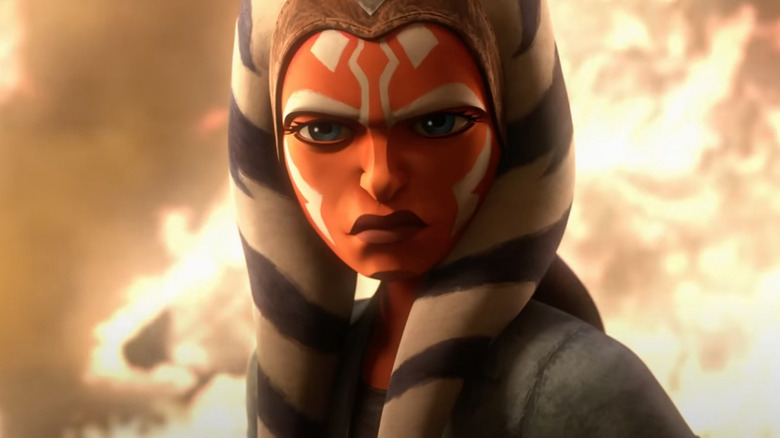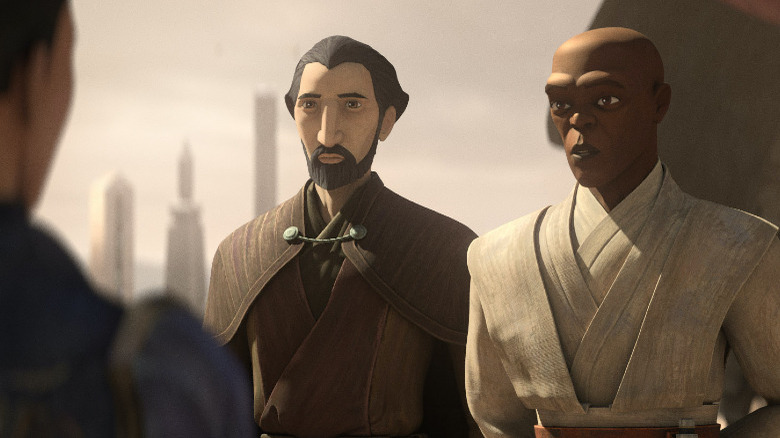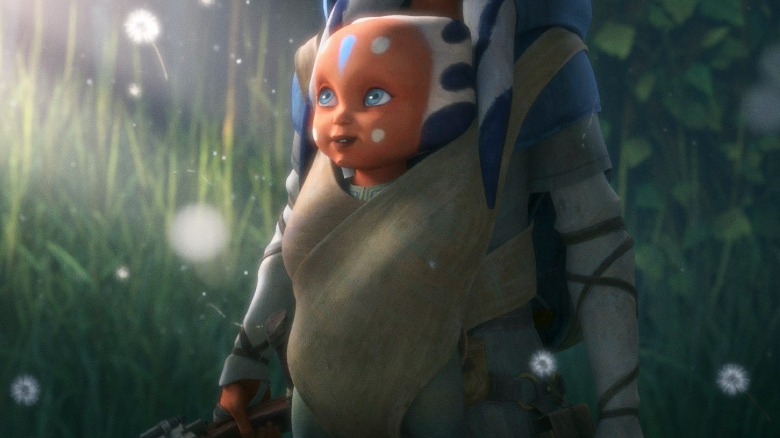The Daily Stream: Tales Of The Jedi Shows That Star Wars Can Be Many Things
(Welcome to The Daily Stream, an ongoing series in which the /Film team shares what they've been watching, why it's worth checking out, and where you can stream it.)
The Series: "Tales of the Jedi"
Where You Can Stream It: Disney+
The Pitch: It has come to this author's attention that "Tales of the Jedi" — an animated six-part miniseries that Bryan Young reviewed for /Film — is being propped up by certain individuals as "Star Wars" done "correctly." Those same people are also taking umbrage with the live-action series "Andor," arguing that it strays too far from George Lucas' original vision of a galaxy far, far away.
There is, of course, nothing wrong with preferring "Tales of the Jedi" to "Andor." Nor is it wrong to argue the former is better executed than the latter in terms of its writing and craft. But to insist that "Star Wars" or any other equally long-running intellectual property can and should only be one thing feels counterintuitive to making great art.
From my point of view the Jedi are evil, "Andor" is not only perhaps the best live-action "Star Wars" project made under Disney (and maybe even ever), but it also honors the radical politics at the core of "Star Wars: A New Hope" while evolving them for a post-2020 world. "Tales of the Jedi," by that same token, sees creator and head writer Dave Filoni refining his storytelling approach from earlier "Star Wars" shows, both animated and live-action. The results might be the best animated "Star Wars" project to date — and that's coming from a devoted "Star Wars Rebels" fan.
Why it's essential viewing
"Tales of the Jedi" splits its focus equally between Count Dooku and Ahsoka Tano. Over the course of three 15-minute episodes, the show realizes the tragedy of Dooku's fall to the dark side to powerful effect. We watch as the seasoned Jedi (his dignified voice once again provided by Corey Burton, who is wonderful as ever) grows ever more weary of the corruption within the Galactic Senate and the Jedi High Council's refusal to do anything about it, and we sympathize with him. When his apprentice, Qui-Gon Jinn, is killed, Dooku's pain is all too palpable.
If ever there was ever a single moment in "Star Wars" that exposed the failings of the old Jedi Order, it's the scene where Dooku stoically ruminates on Quin-Gon's death on Coruscant. In keeping with the Jedi code, he's not even permitted to openly grieve the loss of the only person who fully empathized with his concerns about the duplicity of the Galactic Republic. Is it any wonder that Dooku, in his suffering, turned to someone who promised the radical change he sought, only to exploit him to serve their own purposes?
The episodes about Ahsoka (Ashley Eckstein, excellent as usual) are just as emotional as those about Dooku. "Tales of the Jedi" begins with the thrilling "Life and Death," a chapter that reveals how the infant Ahsoka's latent Force abilities manifested after a near-death encounter. This story is juxtaposed with episodes that are just as intense yet also poignant, shedding light on how Ahsoka was really able to survive Order 66 and the events that led to her picking back up her lightsaber after the Clone Wars (a partial re-telling of E. K. Johnston's great 2016 novel "Ahsoka").
Spirituality and politics
With only six episodes, all but one of which is written by Dave Filoni, "Tales of the Jedi" is a perfect distillation of what viewers have come to expect from "Star Wars" animation. Between its motifs about nature and disillusioned warriors struggling to follow their strict codes of honor, it seamlessly merges the spiritual concerns of Akira Kurosawa's period films with the environmental themes of Hayao Miyazaki and his animated fantasy adventures. That extends to its minimalist dialogue, which allows the series' gorgeous visuals (a mix of colors and styles from not just "Star Wars Rebels" and "Clone Wars" but also the "Star Wars" prequel films) to do much of the heavy lifting.
Like "Andor," "Tales of the Jedi" isn't afraid to wear its politics on its sleeves. It highlights how the complacency of the Jedi and their refusal to interfere in the business of the Galactic Senate only led to rampant misconduct and deception long before the rise of the Galactic Empire. Characters who refuse to get involved or attempt to remain neutral in political matters are as much the antagonists here as the Sith Lords and Inquisitors that Dooku and Ahsoka come face-to-face with in the series (with dramatically different outcomes).
To circle back to an earlier point, "Star Wars" can and should be many things. It can be hopeful and exciting while at other times being dispiriting and melancholy, as "Tales of the Jedi" is. It can also be as worlds apart in terms of its influences as "Tales of the Jedi" and "Andor" while being similarly outspoken in their political commentary and sharing many of the same anxieties. There's no reason to tear down any one approach as being "wrong" when the final products are both terrific in their own ways.


